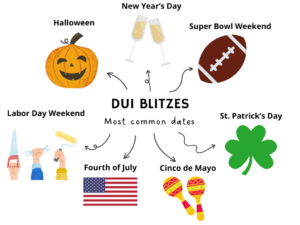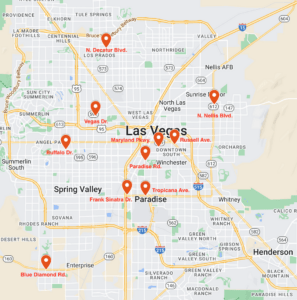Nevada law permits DUI checkpoints, where police set up roadblocks and check every passing motorist for signs of intoxication. However, Las Vegas police no longer use checkpoints; instead, officers conduct “DUI blitzes” where they drive around the city on the lookout for DUI suspects to pull over.1
Upcoming and Past DUI checkpoints & blitzes
In this article our Las Vegas DUI attorneys discuss:
- 1. Definition of DUI checkpoints and blitzes in Nevada
- 2. How do they work?
- 3. Are they legal?
- 4. Is there advanced notice of Las Vegas DUI checkpoints and blitzes?
- 5. Where do police commonly conduct blitzes?
- 6. What are the penalties for driving through DUI checkpoints without stopping?
- 7. What are common defenses to DUI checkpoint arrests?
- 8. When can my criminal record be sealed?
- Additional resources
1. Definition of DUI checkpoints and blitzes in Nevada
DUI checkpoints are cordoned-off areas of roads where police stop every driver to check whether they are under the influence. All drivers going through the checkpoints get stopped, not only those exhibiting signs of intoxication. Then police arrest the motorists they believe are driving drunk or driving under the influence of drugs.
Sometimes, police officers at roadblocks do not stop every car but every fourth car, or every license plate that starts with an even number, etc. Any predetermined formula for detaining drivers is allowed as long as it is not in any way discriminatory.
In contrast, blitzes are where police drive around and actively hunt for DUI suspects to pull over. Las Vegas police no longer set up checkpoints and only conduct blitzes.
Police typically carry out blitzes in high-traffic areas during holiday weekends or special events when heavy drinking goes on:2

2. How do they work?
When you are stopped by police during a DUI blitz, the procedure is the same as if you were pulled over at any other time on suspicion of drunk driving.
When you are driving into a sobriety checkpoint (which no longer occur in Las Vegas), there is a more formal procedure: Officers will stop you and ask some questions like,
- “Have you been drinking?”
- “Where are you coming from?”
- “Where are you going?”
You are not obligated to answer these questions because of your Fifth Amendment against self-incrimination. Though instead of being rude, you are advised to respond politely, “Thank you, but I decline to answer.”
The only question you have to answer is if they ask your name. The officer may also ask you to show your driver’s license, registration, and proof of insurance, which you are legally obligated to produce during a traffic stop.3
Some drivers try to avoid rolling down their windows by holding up their license, etc. against the glass. In practice, the officer will claim they cannot see well that way and will require you to roll down your window (which will allow them to smell your breath).
If it is nighttime, officers usually shine a flashlight into the vehicle to see if you are transporting alcohol in violation of Nevada’s open container laws (NRS 484B.150).

DUI checkpoints are an exception to the “probable cause” rule.
If you seem sober, the officers will allow you to continue through the checkpoint. Though if the officers reasonably suspect that you are a drunk driver, you will be directed to a nearby area for tests. Examples of impaired behavior include:
- Bad driving,
- An odor of alcohol on your breath,
- Open or empty alcohol containers,
- Bloodshot or glassy eyes, or
- Slurred speech patterns
The police may ask you to take a preliminary breath test (PBT) and perform field sobriety tests (FSTs). Depending on the results, you may be arrested for driving under the influence and be required to submit to an evidentiary breath test or blood test.
Even if you are not intoxicated, you could still be cited for other traffic violations, such as driving without a valid driver’s license (NRS 483.230) or driving on a suspended license (NRS 483.560).
3. Are they legal?
It is always legal for Nevada police to pull you over if they reasonably suspect you of DUI. This is true whether or not the traffic stop occurs during a formal DUI blitz.
Meanwhile, DUI checkpoints are legal only if police abide by the following four rules:
- The checkpoint must be clearly visible to approaching traffic from 100 yards away;
- A “Stop” sign must be placed near the centerline of the highway that is readable from 50 yards away;
- A flashing red light at the side of the highway must be clearly visible to oncoming traffic 100 yards away; and
- There must be warning signs at the side of the highway at least a quarter-mile from the roadblock to notify oncoming traffic about it. Additionally, these signs must be accompanied by a burning beam light, flare or lantern to attract attention.
If the police fail to follow these protocols, your charges for driving through a roadblock may be reduced or dismissed.4
4. Is there advanced notice of DUI checkpoints and blitzes?
Nevada police may set up roadblocks and conduct blitzes without publicizing it first.5 However, law enforcement sometimes does disclose DUI checkpoints and blitzes a few days in advance.
5. Where do police commonly conduct blitzes?
Area commands patrol the entirety of Las Vegas. In our experience, the highest concentration of police cars during blitzes are in the following locations:

6. What are the penalties for driving through DUI checkpoints without stopping?
Traveling through a Nevada administrative DUI roadblock without stopping is a gross misdemeanor in violation of NRS 484B.580. Penalties include:
- Up to 364 days in jail, and/or
- Up to $2,000 in fines
Sometimes people try to barrel through a roadblock and speed away, which will just result in a police chase and probably a collision.
When illegally driving through the roadblock results in death, substantial bodily harm or damage to property in excess of $1,000, you face category B felony charges. The punishment includes:
- One to six (1 – 6) years in Nevada State Prison, and/or
- Up to $5,000 in fines6
Depending on the case, you may face drunk or drugged driving charges as well. See our article about Nevada DUI penalties.

DUI checkpoints are legal only if they display proper signage and signals.
Can I turn around if I see a checkpoint in the distance?
Yes. If you see warning signs of an upcoming DUI checkpoint in Nevada, you are allowed to take any legal detour prior to that checkpoint (such as through a side street) to avoid going through it.
Though you may not make an illegal U-turn (NRS 484B.403) or an improper turn (NRS 484B.400) or do anything else dangerously risky in order to escape a roadblock.7
7. What are common defenses to DUI checkpoint arrests?
Three common defenses to fight DUI checkpoint charges that our Nevada criminal defense attorneys rely on include:
- You followed the officer’s directions. Perhaps in the chaos of the roadblock, the police mistakenly thought you were disobeying them.
- The checkpoint was not legal. For example, perhaps the officers failed to erect the proper signage and signals.
- The police committed misconduct. Examples include the officer asking questions that are unreasonably intrusive or arresting you without sufficient probable cause (a “hunch” is not enough).
Currently, it is not a defense to argue that DUI checkpoints are unconstitutional. Police stopping you with no probable cause seems like an unlawful search and seizure, though the U.S. Supreme Court ruled that correctly administered roadblocks are consistent with the Fourth Amendment.8
8. When can my criminal record be sealed?
| Disobeying a Nevada DUI checkpoint | Record Seal wait time |
| Category B felony conviction | 5 years after the case ends |
| Gross misdemeanor conviction | 2 years after the case ends |
| Dismissal | Immediately |
Note that a misdemeanor DUI conviction has a seven (7) year waiting period for a record seal, whether or not a checkpoint was involved. Plus felony DUI convictions may never be sealed.9
Additional resources
For more information, refer to the following:
- Alcoholics Anonymous – 12-step program to overcome alcoholism.
- Overcoming Alcohol Addiction – Information and support by helpguide.org.
- DUI schools by the Nevada Department of Motor Vehicles – The NV DMV lists all the official providers of alcohol education classes recognized by state and municipal courts.
- Impaired Driving Program by the Nevada State Police Office of Traffic Safety – A state program aimed at reducing serious and fatal DUI accidents.
- Nevada Approved Ignition Interlock Devices – List by the Nevada State Police Office of Public Safety.
Legal References:
- Sabrina Schnur, Las Vegas police DUI initiative aims for more arrests, fewer deaths, Las Vegas Review-Journal (February 12, 2021).
- NRS 484B.750. See, for example, Austin Carter, 23 drivers arrested at DUI checkpoint on Super Bowl Sunday, KTNV Channel 13 ABC (February 2019). Common DUI checkpoint dates are New Year’s Eve, Super Bowl Weekend, St. Patrick’s Day, Cinco de Mayo, Fourth of July, Labor Day Weekend, and Halloween.
- NRS 171.123. NRS 483.350. NRS 484A.650. NRS 482.255.
- NRS 484B.570. See also Motor Vehicle Safety Intervention Fact Sheets, CDC.
- NRS 484B.570; see, for example, Austin Carter, DUI Strike Team makes hundreds of arrests in 2019, KTNV Channel 13 ABC (January 2, 2020).
- NRS 484B.580.
- Same.
- Michigan Dept. of State Police v. Sitz (1990) 496 U.S. 444 (the public interest behind preventing DUI-related injuries and deaths is outweighed by any invasion of privacy the roadblocks cause, especially since the police questions are arguably not intrusive and do not delay drivers too much.)
- NRS 179.245; NRS 179.255.

